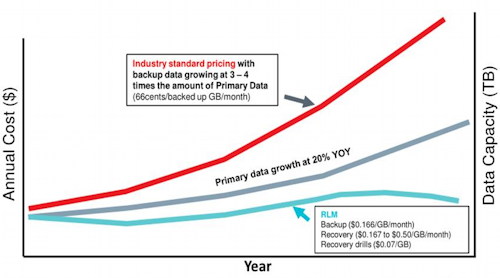For reasons that elude me I accepted Asigra’s invitation to attend their Toronto Partner Summit last week. I’m glad I did.
After all, I hate backup. Not because I like losing data, but because it reminds me how flaky digital storage is.
Asigra is the largest backup company you’ve never heard of. They’ve been in business since 1986, sell exclusively through channels, and are often rebranded by MSPs. Thus their anonymity.
Recovery license model
What’s impressive is their new recovery license model (RLM). Basic idea: pay for data recovery, not backup.
This means that if you don’t need to recover often, you pay less. A direct financial incentive to properly support backup.
The play
Currently backup software is sold on a capacity basis. Customers dislike this model because their budgetary pressures grow along with their data volumes.
RLM separates backup and recovery license costs. There is a capacity-based backup license cost – at a fraction of current cost – but also a recovery license cost. The latter is variable based on recovery performance.
Core components of the recovery license model include a recovery tracker, a recovery performance score and recovery drills.
The recovery tracker reports on the number of recoveries, the amount of data recovered, the source of the data loss and the reason for the restore.
The recovery performance scores measured on a scale from 0 to 10. The scale relates to the price per gigabyte for recovery. Performance is simply the percentage of customer data that is recovered each year. Customers who recover 25% or more of their data each year get a score of zero. As their recovery percentage declines their score rises and their cost per gigabyte recovered drops.
Recovery drills are planned tests of recovery discipline. Recovery drill capacity is purchased at least 30 days in advance and used as needed.
Listen to market
Asigra talked to 500 customers and resellers over more than a year to develop RLM. There are a number of thoughtful touches:
- Only successful recoveries count.
- The single largest recovery event of the year isn’t counted in the recovery score.
- Reseller’s recovery scores are calculated against their entire customer base, not by individual customers. A couple of “bad” customers won’t raise the reseller’s score.
- Current capacity license model continues for those who want to use it.
- RLM is a significant price cut for all customers, and the recovery license price is capped at a 25% recovery score.
Here’s a graph from Asigra showing what financial impact a customer might see:

Why?
Asigra believes that the capacity pricing model is a race to the bottom. Data growth means that customers are always pressured to get bigger discounts and vendors in this competitive market are pressured to give them.
By shifting the focus from capacity to recovery Asigra thinks they can change this dynamic. Customers get some direct control of costs. CIOs get a metric they can use to show CFOs the return on improved backup investments. Resellers can use a consultative sales model that is less adversarial.
Asigra, of course, gets first mover advantage; forces competitors to react; and plenty of free ink. As a privately-held company they can better handle the inevitable revenue growth hit that offering lower prices causes.
The StorageMojo take
Smart.
I was impressed with the business acumen of founder and CEO David Farajun and his son, EVP Eran Farajun. The research seemed thorough; implementation thoughtful; and there’s a clear intention to tweak the offer as they get more market feedback.
StorageMojo doesn’t much follow the backup market. But it’s certainly going to be more interesting after this.
Courteous comments welcome, of course. How would lower backup costs based on fewer recoveries affect you?
Also, for those interested, a couple of US resellers at the conference impressed me: BUMI – who recovered customer data after Sandy while themselves under 35 feet of water – and Electronic Vaulting Services, who service FedEx.
Asigra paid many of the trip expenses, but did not pay for this post. Nor do I have any business with BUMI or EVS.


So, Asigra’s revenues will decline accordingly, and the money they have available to re-invest back into the product for future development will be impacted accordingly. Their future is….
We were very intrigued by the RLM concept. Contacted Asigra, and several of their resellers, including the ones mentioned here. They all knew of the RLM offering, but claimed that the implementation details have not come down from Asigra yet, and as such, they could not make any RLM based proposals. But they were all eager to discuss the standard implementation. Feels like spinning wheels. This has made the experience somewhat frustrating thus far…
We appreciate your comment and interest in the new Asigra Recovery License Model. We do have numerous examples of partners who are currently in the process of implementing the Model. If you or anyone else is interested in speaking with these partners, we are always willing to connect our partners to organizations that are interested in learning more about their services.
It is difficult for us to address the specific challenges that you may have encountered during your initial conversations with Asigra since we’re unable to track any of our interactions with you (cuz we’re not sure who you are;)). But with that being said you can always send us an email at info@asigra.com or private message us on Twitter, @Asigra and we can resolve any issues you might have.